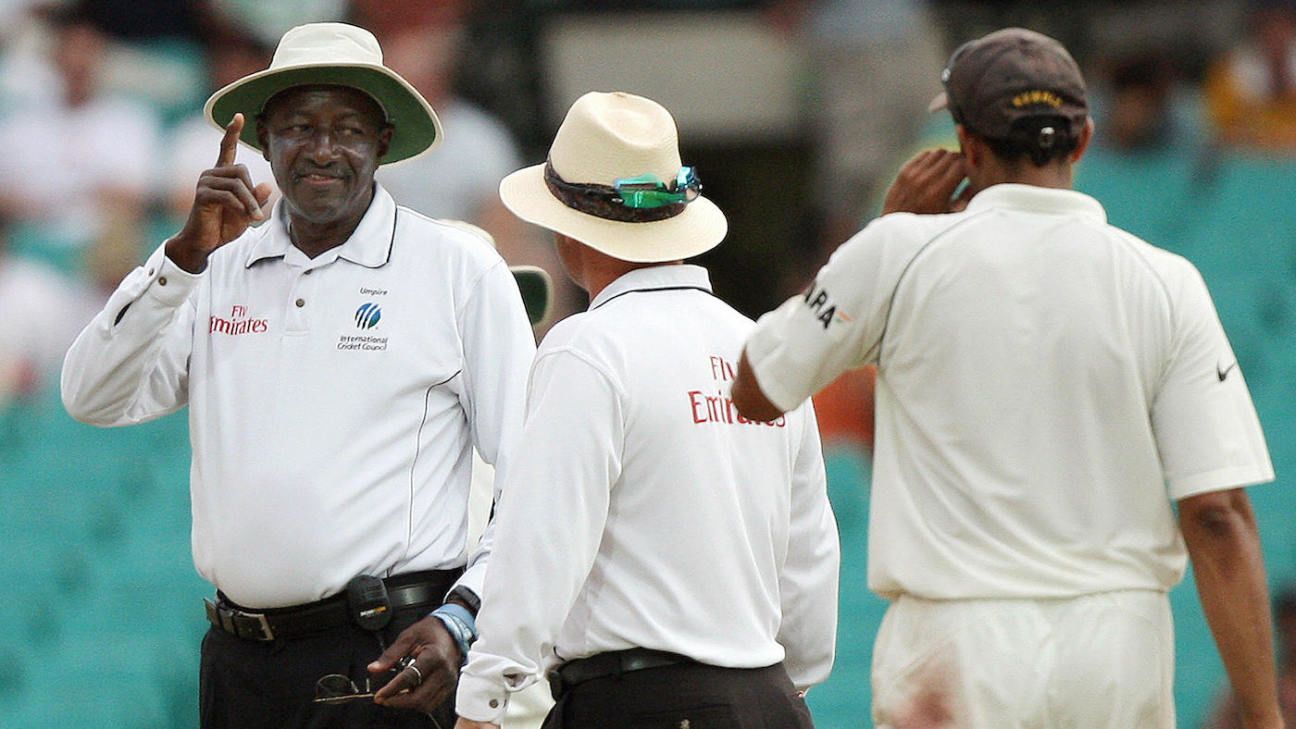Steve Bucknor, in speaking about his career, has said that he made “two mistakes” during the controversial Australia-India Sydney Test in 2008, which made headlines for the “monkeygate” spat between Andrew Symonds and Harbhajan Singh and the contentious umpiring decisions.
In an interview with Mid-Day, Bucknor said: “I made two mistakes in the Sydney Test in 2008. Mistake one, which happened when India were doing well, allowed an Australian batsman to get a hundred. Mistake two, on day five, might have cost India the game. But still, they are two mistakes over five days. Was I the first umpire to make two mistakes in a Test? Still, those two mistakes seem to have haunted me.”
India had reduced the hosts to 134 for 6 on the first day before an unbeaten 162 from Symonds and half-centuries from Brad Hogg and Brett Lee propelled Australia to a commanding 463. The first decision Bucknor refers to was when Symonds, on 30, edged a delivery from Ishant Sharma to MS Dhoni but Bucknor remained unmoved. Replays later showed Snicko had picked up the edge but there was no DRS at the time.
The other decision Bucknor recalls probably refers to Rahul Dravid’s dismissal on the last day when India were set 333 to chase from a possible 72 overs. In the 34th over of the chase, with India fighting for a draw on 115 for 3, Bucknor ruled Dravid caught behind. Dravid’s bat was tucked behind his pad, and replays confirmed the ball had flicked Dravid’s front knee roll on the way. Michael Clarke later picked up the last three India wickets in five balls with about six minutes to spare, and Australia won the match and took a 2-0 series lead.
“You need to know why mistakes are made,” Bucknor said. “You don’t want to make similar mistakes again. I am not giving excuses but there are times when the wind is blowing down the pitch and the sound travels with the wind. The commentators hear the nick from the stump mic but the umpires may not be sure. These are things spectators won’t know.”
The episode became a blot on Bucknor’s otherwise celebrated record, as he was removed by the ICC from officiating in the third Australia-India Test in Perth.
Looking back at happier times from his career, Bucknor recalled two World Cups, starting with 1992 when he had officiated only in a handful international matches but got to stand in the final. He would go on to officiate in four more consecutive finals until the 2007 edition.
“I stood in only four Tests and three ODIs before that [1992 World Cup],” Bucknor recalled. “And I was the only umpire from the Caribbean at that World Cup. So I didn’t know if I was good enough to be there. During the tournament, I was told I was doing very well. The captains had good things to say. My aim was to be among the six umpires for the semi-finals. I would have been happy to even be a reserve umpire. I stood in the New Zealand versus Pakistan semi-final in Auckland. And after the match I was told, ‘Bucknor, you’re doing the final.’
“I remember in 1996, West Indies versus Australia in the semi-final. I was in Delhi and I left my hotel room when Australia were 15 for 4. I went down to the lobby and told them to book my tickets to Jamaica. I then packed my bags and got ready to leave the next morning. That night, West Indies lost. I was sad because I wanted West Indies in the final. But personally, I was happy. Once the game was over, I was told, ‘Bucknor, first flight out to Pakistan for the final.'”
The former umpire also explained his signature style of taking a long pause before declaring a batsman out. “I created replays in my mind,” he said. “Did the ball pitch outside leg? Was it high? Is it missing off? These are the questions I asked myself. I was criticised in my own country when I started out. One commentator said that if there is an appeal in the last over of the day, Bucknor’s finger will go up the next morning.”
Bucknor retired in 2009 after officiating in 128 Tests and 181 ODIs; his Test record of umpiring in most matches was broken by Aleem Dar in December 2019.
